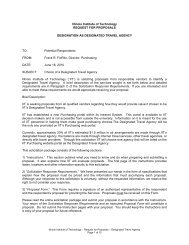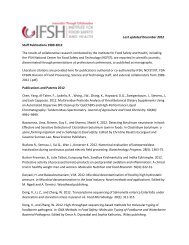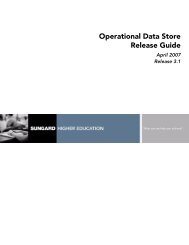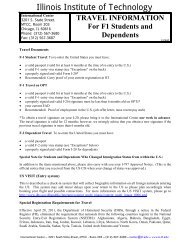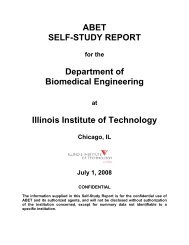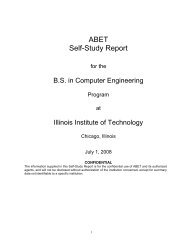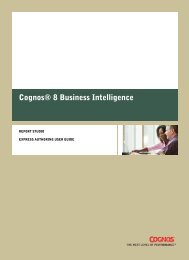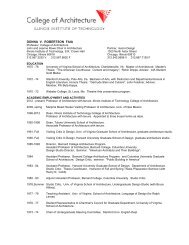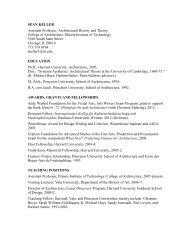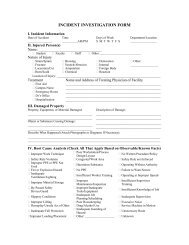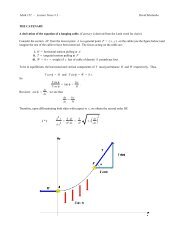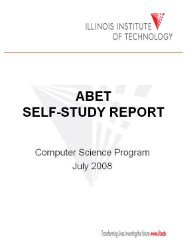Download entire Student Handbook - Illinois Institute of Technology
Download entire Student Handbook - Illinois Institute of Technology
Download entire Student Handbook - Illinois Institute of Technology
You also want an ePaper? Increase the reach of your titles
YUMPU automatically turns print PDFs into web optimized ePapers that Google loves.
B. Conduct Discipline<br />
The judicial process, which exists in order to maintain the safe and efficient operations <strong>of</strong> the University<br />
and to aid in advancing its academic mission, is based on the assumption that disciplinary procedures,<br />
when required, should be an educational process. Disciplinary sanctions are imposed to help students<br />
develop individual responsibility and encourage self-discipline, to foster a respect for the rights <strong>of</strong> others,<br />
and to protect the rights, freedoms and safety <strong>of</strong> all members <strong>of</strong> the University community. Hearings or<br />
appeals processes are not courts <strong>of</strong> law and are not governed by criminal or civil court procedures. The<br />
only process to which a student is entitled is the process provided for in this <strong>Handbook</strong>. However,<br />
because some violations <strong>of</strong> the Code <strong>of</strong> Conduct are also violations <strong>of</strong> the law, students may be<br />
accountable to both law enforcement agencies and the University for their actions. The University’s judicial<br />
process will normally proceed notwithstanding any external civil or criminal proceeding.<br />
1. Good Samaritan Provision<br />
In an effort to encourage students to help one another by contacting the appropriate administrative<br />
department / authority in critical situations (Public Safety, Housing & Residential Services, Office <strong>of</strong> the<br />
Dean <strong>of</strong> <strong>Student</strong>s, Counseling Center) or 911 Emergency Assistance, a student who seeks assistance for<br />
another student, who is experiencing a drug or alcohol emergency, will not be subject to disciplinary action<br />
by the Dean <strong>of</strong> <strong>Student</strong>s’ Office. This provision applies only to individuals, not organizations.<br />
This policy is not meant to promote unlawful drug or alcohol use among students. Rather, it is intended to<br />
provide a “Good Samaritan” provision within the Code <strong>of</strong> Conduct to encourage responsible reporting to<br />
the appropriate authority when a student is in need <strong>of</strong> help. Accordingly, it is expected that any reporting<br />
will be done in good faith. The Dean <strong>of</strong> <strong>Student</strong>s or his or her designee will investigate the circumstances<br />
involving the request for assistance and may also require a reporting student to participate in drug or<br />
alcohol abuse education or counseling as appropriate.<br />
Reporting pursuant to this policy will be monitored and the Dean <strong>of</strong> <strong>Student</strong>s retains the authority to<br />
pursue, in accordance with the Code <strong>of</strong> Conduct and applicable law, disciplinary action against and/or<br />
contact the parents <strong>of</strong> students who abuse it.<br />
2. Complaints<br />
Anyone – student, staff member, faculty member or non-IIT individual – may initiate a complaint against a<br />
current or formerly enrolled student for misconduct. (A complaint may also take the form <strong>of</strong> an IIT<br />
Department <strong>of</strong> Public Safety Incident Report regarding student conduct.) Complaints must be in<br />
writing and may be filed with any <strong>of</strong> the following <strong>of</strong>fices:<br />
<br />
<br />
<br />
<br />
Office <strong>of</strong> the Dean <strong>of</strong> <strong>Student</strong>s;<br />
Office <strong>of</strong> Residential & Greek Life;<br />
Public Safety; or<br />
Greek Council.<br />
All complaints will be processed through the Office <strong>of</strong> the Dean <strong>of</strong> <strong>Student</strong>s. This Office will review the<br />
complaints and determine the appropriate course <strong>of</strong> action. Less serious <strong>of</strong>fenses involving fraternity or<br />
sorority regulations will be heard by the Greek Council. Similarly, less serious <strong>of</strong>fenses involving residence<br />
hall violations will be heard by appropriate Residence & Greek Life staff.<br />
3. Disciplinary Proceedings<br />
a. Notification<br />
Within the time periods set forth below, notification <strong>of</strong> an investigatory meeting and/or hearing will be provided<br />
by the Office <strong>of</strong> the Dean <strong>of</strong> <strong>Student</strong>s and will include a summary <strong>of</strong> the violation(s) alleged and the time<br />
and place <strong>of</strong> the meeting or hearing. Once proper notification has been given, the University reserves the<br />
right to hold the hearing whether or not the student elects to participate. Email correspondence will be<br />
considered sufficient written notification in all instances where written notification is required.<br />
In the conduct hearings described below, the student alleged to have violated the Code <strong>of</strong> Conduct has the<br />
right to be accompanied by an advisor, witnesses on his or her behalf and his or her parents. The advisor is<br />
limited to advising the student and may not participate in presenting the case, questioning witnesses or<br />
making statements during the hearing. A recording <strong>of</strong> the hearing will be made and will remain the sole



